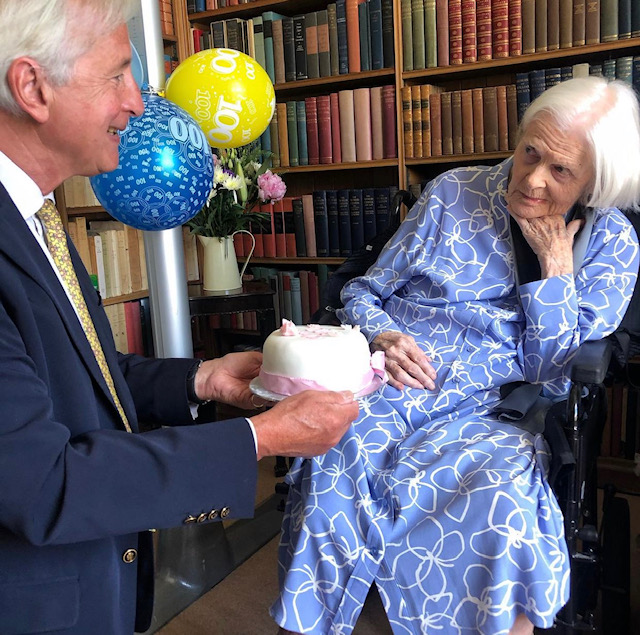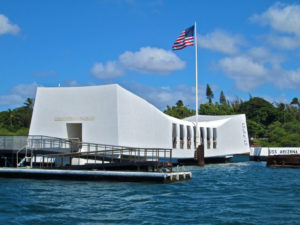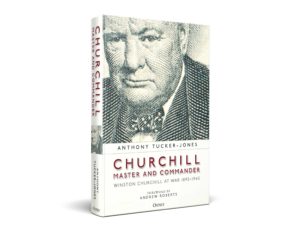Bulletin #162 — Dec 2021
Clarissa Eden RIP

Lady Avon on her 100th birthday in 2020 with Hugo Vickers. To view in full, right click and choose "Open in New Tab"
November 28, 2021
Countess of Avon, Niece of Winston Churchill, Dies at 101
By HUGO VICKERS
On a grey November afternoon, in the presence of a small congregation of family and close friends, Clarissa Eden, Countess of Avon, niece of Sir Winston, was finally laid to rest next to her husband, Anthony Eden, having been a widow for more than forty-four years. The vicar was joined by Canon Adrian Daffern, who had been at Blenheim Palace for several years, there was fine music, singing of hymns and the lesson read by Jack Churchill, great-grandson of Sir Winston. As a friend of some forty-two years it fell to me to give the address.
The Avons loved Wiltshire. On a visit in 2010, Clarissa, then aged 89, wrote in her diary: “Lovely, lovely country…views, etc. Then on to Alvediston. At once I feel at home, out of the wooded valleys & into the green downs. We battle our way through flocks of rams to get to the church.”
Anthony Eden had been flown home to Britain from America in January 1977 to spend his last days at home in his own bed, the flight sanctioned by the Prime Minister, James Callaghan, at the request of “Young” Winston Churchill. I remember photographs of Clarissa, on the arm of her stepson, Nicholas, as Lord Avon was laid to rest in the churchyard, where sadly Nicholas soon followed him. Only a few years later, I saw Clarissa, again in black, standing slightly distant from the others, in the churchyard at Broadchalke as Cecil Beaton was lowered into his grave in January 1980. I did not know then that I would have the privilege of becoming her friend.
Neither she nor Anthony Eden had been born or brought up in Wiltshire, but thanks to the wonderful Edith Olivier who steered Cecil Beaton to Ashcombe and Reddish, and Cecil Beaton who suggested the Rose Bower in Bowerchalke to Clarissa, they fell in love with Wiltshire. After some years at Bowerchalke, they moved to Fyfield, and finally to the Manor House, in Alvediston in 1967—where she stayed until 1982. In his long years of retirement, Anthony Eden loved his house, his farm, his cattle, and he took Avon as his title when made an Earl in 1961.
Clarissa will be remembered differently by many whose paths she crossed. Some found her distant and disapproving, which she could be (rather enjoyably, actually), and others no doubt found her somewhat authoritarian (such as the youthful steward, John Prescott, aboard the ship that took them to New Zealand in 1957). But to those in her family and to the friends she allowed into her world, she will be remembered for her sparkling intelligence, her exquisite taste, her unique sometimes impish sense of humour, her love and knowledge of literature, music and the arts, her extraordinary Garbo-esque beauty, and her quality of unswerving loyalty.
There were three parts to her life—her early haute Bohemian youth—her marriage to Anthony Eden—and then the long years of widowhood. By all accounts, including her own, she was remote as a child. She once said that Cecil Beaton had to escape from his family background and find his own world, and to some extent that is true of her too. She declared that she never spoke unless she had something pertinent to say and so often remained silent.
She was not destined for a conventional life, the social world holding little allure for her, while she eschewed traditional aristocratic rural pursuits. She loved to read—she read voraciously and very fast (I once saw her devour a novel in an afternoon), she loved art, she loved music—especially opera. She soon found her way into an interesting intellectual set, being taught philosophy by Freddy Ayer, and studying with Lord David Cecil at Oxford. Here the gifts of being exceptionally beautiful, intelligent and well connected, stood her in good stead. Her world was enriched by her friendships with James Pope-Hennessy, Evelyn Waugh, Lord Berners at Faringdon and many, many more. She undertook a variety of jobs, including working for the publisher George Weidenfeld and the film producer Alexander Korda.
And then at the age of thirty-two, she married Anthony Eden, then Foreign Secretary and later Prime Minister. Now her world was peopled with de Gaulle, Eisenhower, Krushchev and Bulganin. An enjoyable feature of reading her letters from those years was to find distinguished politicians of the day being dismissed as buffoons, and one day—but not yet—her description of the fall of Harold Macmillan should be made public.
She came into Anthony Eden’s life at a difficult time. Her uncle, Winston Churchill played a cat and mouse game, one minute about to retire, then staying on, then about to go, and finally lingering until 1955. “He resigned for the tenth and last time,” she said. There is an argument that Eden came to the premiership too late, when already his health was failing. After Suez, when he stepped down, Clarissa devoted herself to caring for him—and never was that loyalty more fully engaged. She looked after him beautifully, surrendering her own interests to that cause, and it was by all accounts a very happy marriage. They travelled widely and enjoyed winters on Becquie and later in Barbados.
Numerous distinguished visitors came to see them in Alvediston. One day in 1975 Margaret Thatcher arrived for lunch by helicopter. Some visitors were more organised than others. Harold Macmillan, expected for lunch, failed to materialise and was finally located sitting forlornly on a bench at Salisbury Station. But when they invited Field Marshal Montgomery, they were surprised to spot a fore-runner scouting about in the Wiltshire lanes, planting pointer arrows on the corners of the roads to bring him with meticulous timing and precision to their door.
Only after Eden died did Clarissa resume her London life, the opera and theatre and her more Bohemian friends. She even took to deep sea diving and, while on the ocean bed, would swim with her air bottle strapped to her back and carrying a stick. She was fiercely protective of Eden’s memory. Dissatisfied with the Rhodes James biography, she commissioned D. R. Thorpe to write another. To assist him, she made copious investigations into her husband’s health and state of mind during the Suez crisis so that he be fairly assessed.
I loved her take on life. I remember telling her that in Australia James Fairfax (a friend we had in common) had sent a car to collect me from Canberra, to bring me for lunch to his country home, Retford Park, in Bowral, and take me on to Sydney, a considerable distance. Did she say: “How kind of him?” Not at all. Her comment was: “He must have been desperate for company.” And I loved the way she expressed the wish to leave a dinner in Patmos: “I think we’ve exhausted the social possibilities of this evening, don’t you?” She had a quality of positive negativity.
To live to the age of 101 is a challenge. She was lucky to be able to stay in her lovely apartment in Bryanston Square, her niece Sally, Lady Ashburton, working tirelessly to make this possible and overseeing a group of devoted carers. On the last night of her life, Clarissa enjoyed a chocolate soufflé and a glass of champagne and then, the following morning, she simply did not wake up. On the afternoon of 24 November, she finally went home—to rest at Anthony Eden’s side, in a remote churchyard in the green downs of the beautiful Wiltshire countryside.
Hugo Vickers many books include Malice in Wonderland: My Adventures in the World of Cecil Beaton.
Subscribe
WANT MORE?
Get the Churchill Bulletin delivered to your inbox once a month.






